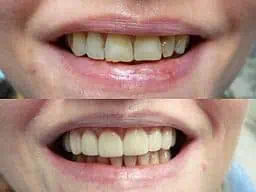Does flashing a big smile make you feel self-conscious? Composite veneers may help you boost your confidence and give you the perfect smile you’ve always longed for.
Treating tooth stains that are caused by tobacco, coffee, wine, or cola-based drinks can often be challenging, especially with at-home tooth whitening treatments.
These acidic foods can wear down tooth enamel, and once enamel is damaged, it doesn’t grow back. This can lead to various oral health issues, like tooth decay.
Dental veneers present an all-around solution to these types of problems. Whether you have discoloured, chipped, or crooked teeth, a composite resin veneer can hide them all. And the process is simple!
But before you decide to get composite veneers, let’s take a closer look and if they’re right for you.
In This Article
- 1 What are composite veneers?
- 2 How much do composite veneers cost in the UK?
- 3 Can you get composite veneers on the NHS?
- 4 Composite veneers procedure
- 5 How to maintain composite veneers
- 6 Composite veneers vs. porcelain veneers
- 7 Where to get composite veneers near me
- 8 Composite veneers reviews
- 9 Conclusion
- 10 FAQs
What are composite veneers?

dentists suggest dental veneers.
A composite veneer is a thin shell designed to cover imperfections in the shape, size, or colour of your tooth. These aesthetic restorations are made from a special composite resin material.
Composite resin is commonly used for various other dental procedures, like fillings and dental bonding. This tooth-coloured resin produces lifelike results that restore your smile. Also, because they’re minimally invasive, you typically don’t feel much discomfort during or after the procedure.
Indications for dental veneers include:
1) Permanent stains in teeth associated with tetracycline, fluorosis, amelogenesis imperfect.
2) Fractured and worn teeth.
3) Abnormal tooth shape.
4) Minor tooth malposition.
5) Intra-oral repair of fractured crown and bridge facings.
Limitations for dental veneers include:
1) lrregular habits such as bruxism.
2) Abnormal contact between upper and lower teeth.
3) Deficient oral hygiene.
4) Scarce enamel structure.
How much do composite veneers cost in the UK?
One of the chief advantages is affordability: composite veneers cost £100 to £400 per tooth in the UK. While cost might not be an issue if improving aesthetics is your top priority, it is an important factor when those treatments aren’t covered by insurance.
Although they are inexpensive in comparison to porcelain, the exact cost will vary based on where you live, where your dental work is performed, and how many veneers you need.

Can you get composite veneers on the NHS?
You will most likely not be able to get composite veneers on the NHS. This is because dental veneers are a cosmetic procedure, and are only available with the NHS if there is a clinical need for them.
If you do qualify for veneers with the NHS they are a band 3 treatment and will cost you £282.80.
Composite veneers procedure
The process for getting composite veneers can be done in one appointment. This is because the composite resin is layered directly onto your tooth surface and sculpted in your mouth, all on the same day.

The composite veneers procedure for direct veneers involves the following steps:
- Your dentist will thoroughly clean your teeth
- A thin layer of enamel will be shaved from your teeth
- The dentist will etch your enamel to help with adhesion
- Adhesive glue is applied
- Thin layers of composite resin are applied
- The dentist will set or harden the resin with a light
If you are getting indirect veneers the dentist will take a mould of your teeth after they have been shaved. The veneers will then be made outside of your mouth and applied once your teeth have been etched, and the adhesive glue applied.
Once either direct composite veneers or indirect veneers have been applied, the dentist will clean up and polish your veneers and make sure you are happy with them.
The following video shows the full composite veneers procedure, with Dr Osama Shalaan applying a direct composite veneer on a model:
How to maintain composite veneers
You may feel confident about your smile after getting veneers, but over time your they may start to stain. This can be caused by prolonged exposure to drinks like tea, coffee, or wine.
Whitening treatments don’t work as well on composite resin as they do on natural teeth, but at-home whitening treatments can be more cost-effective and accessible than professional whitening.
Let’s have a look at some of the ways you can maintain your composite veneers to make them last longer.
Use a soft bristle toothbrush
Using firm bristles to clean your veneers every day may damage the composite resin or cause the gum line to slightly recede, exposing the base of the veneers. So, it’s advisable to use a soft bristle to avoid causing any damage to the veneers.
Brush your teeth after eating or drinking foods that can cause staining
If you’re a regular smoker or extensive coffee consumer, you may need to brush your teeth two times a day to keep your veneers from getting stained (although that’s good practice anyway). Other acidic and sugary foods can also cause noticeable stains and increase the likelihood of gum disease.
Avoid toothpaste with baking soda
Baking soda is considered to be a great ingredient to clean teeth naturally, but it can be abrasive for composite resin. It can cause them to wear down early and become discoloured. Avoid using baking soda to clean your veneers.
Use polishing toothpaste
Toothpaste brands specially designed for veneers are more convenient for removing plaque buildup. Not only do they help you clean your teeth but also polish your veneers.
You can buy these toothpastes online or from your nearest drug store. Your dentist may also prescribe one. The important thing to note here is that polishing toothpaste will only whiten minor stains, not major ones.
Quit smoking
Smoking is a major cause of discolouration for veneers, as well as natural teeth. You should try and cut down on your smoking as much as possible if you wish to maintain the look of your composite veneers and maintain good oral health.
Composite veneers vs. porcelain veneers
Composite resin isn’t the only veneer material out there. In terms of aesthetics and longevity, porcelain veneers are the preferred, though more expensive option. Both composite and porcelain veneers are great at improving your smile, but depending on your budget, purpose, and the extent of enamel damage, your dentist may prefer one over the other.
If you are interested in porcelain veneers but are put off by the price, you can find more affordable options if you consider teeth veneers abroad. Dental work, like veneers, is much cheaper in countries like Turkey, Poland and Spain.
To find out how much you could save on veneers abroad, you can request a free, no-obligation quotation from dental tourism service Dentaly Go.
Let’s have a look at some of the composite veneers pros and cons and compare them to porcelain veneers.
Time
Composite resin veneers are quick to make and apply, and are often referred to as “same day veneers”. This is because they can be fitted in a single visit and the process is less complicated and more conservative to the integrity of the tooth structure. Your dentist will match the resin to the shade of your surrounding teeth for a natural, blended look. The veneer is bonded to your tooth and polished and you’re good to go.
Fitting porcelain veneers, on the other hand, typically take at least two visits to the dentist’s office and the procedure is more invasive when comes to your teeth structure. They also need to be constructed outside of the practice in a dental lab.
Durability
Diverse studies estimate a survival rate between 80% and 89% after 5 years if you care for composite veneers properly, and if they need to be repaired the process is pretty straightforward.
Porcelain veneers, once bonded to teeth, are extremely durable and can last for up to 15 years, but you’ll need to get them replaced entirely if they get damaged. It has been reported that porcelain veneers have a survival rate of 94.4% after five years, 93.5% after ten years and 91% after 20 years.

Aesthetics
Composite resin veneers are translucent and have a somewhat natural appearance but don’t quite match the natural look of porcelain veneers. And while they look natural, they can gradually stain over time, though not as quickly as natural teeth.
A major benefit that you get with porcelain veneers is that they’re stain-resistant. If you’re concerned about tooth discolouration, get these veneers and say goodbye to monthly teeth whitening procedures.
Cost
The cost of the veneer treatment depends on time, expertise, and resources. Because composite veneers require fewer dentist appointments and resources like a dental lab, they’re less expensive. But looking at durability, the composite resin needs to be replaced or repaired more which contributes to cost long-term.
Here’s a quick summary:
Porcelain Veneers | Composite Veneers | |
Practice Visits | Multiple | Usually just 1 |
Longevity | 10 - 15 years | Up to 5 years |
Aesthetics |
|
|
Cost per tooth | £450 to £850 | £100 to £400 |
Damage to existing teeth | Filing & enamel removal required except for Lumineers | Possible filing & enamel removal |
Dr Marcus Spry further explains the difference between the two veneer types:
Where to get composite veneers near me

You can get veneers at your nearest dental clinic in just one visit. It may take as little as an hour or as long as half a day to complete the procedure, but you can see the results instantly.
This type of restoration requires the dentist to sculpt the composite resin and bond it to the tooth underneath. Getting a natural look requires a skilled hand, so it’s important to find an experienced cosmetic dentist.
Composite veneers reviews
Chloe shares her process of getting dental veneers and shows her amazing results. She’s very happy with the process and we can see her before and after her dental veneers. Se her complete review below:
Conclusion
Dental composite veneers can be a great choice for you if your teeth are severely stained, have become dull due to enamel damage, or have broken or chipped. They can completely transform your smile—in a single clinic visit.
Additionally, they are a safer alternative to cheap solutions like snap-on veneers while being less expensive than some other veneer materials.
We recommend you consult your dentist to find out whether composite veneers are a good solution for you.

FAQs
How much are composite veneers in the UK?
In the UK, composite veneers cost between £100 and £400 per tooth depending on a few different factors. The price can differ from dentist to dentist and between dental practices.
How long do composite veneers last?
Composite resin veneers can last between 4 and 8 years, depending on how well you look after them. But your lifestyle choices can greatly impact the lifespan of your composite veneers. This includes the types of food you eat, and your oral hygiene habits and routine.
How are composite veneers different from dental crowns?
Composite veneers are different from dental crowns in many ways. Ideally, they’re meant to cover only that part of the tooth that’s at the front and aesthetically important to your smile. They also require much less teeth filing compared to dental crowns. This is the reason dental crowns are recommended for patients whose teeth are more damaged.
Is the composite veneers procedure painful?
Getting composite veneers fitted is not considered a painful procedure, but you may experience some sensitivity at the gum line for a short time after the procedure. If dental anxiety is a concern, your dentist may be able to offer some form of sedative to encourage relaxation
The Dental Guide: Instant veneers – costs and information. Consulted 22nd December 2020.
NCBI: Advances in dental veneers: materials, applications, and techniques. Consulted 4th January 2021.
NCBI: The success of dental veneers according to preparation design and material type. Consulted 4th January 2021.





